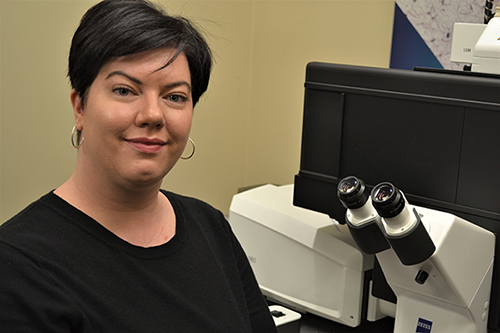According to Prof Chrisna Gouws, associate professor at the North-West University’s (NWU’s) Centre of Excellence for Pharmaceutical Sciences, inquisitiveness and a vigorous personality have led her to where she is today.
This dynamic researcher has a PhD in biochemistry and is well known in the scientific community for publishing numerous notable scientific papers and reviewing manuscripts for international journals.
Part of her current research is focusing on identifying plants with anticancer potential, as well as finding new combinations of conventional drugs and traditional herbal products that will help overcome cancer drug resistance. Moreover, one of her duties as a research professor is to guide her postgraduate students through their research journey and professional development.
Prof Gouws has accomplished much in her career to be proud of, and she attributes her success to her husband of 13 years, a professor in electrical engineering, as well as her two sons, aged nine and six.
“My husband is very supportive of my career and has a good understanding of my working environment since he is an academic himself. His unwavering support gives me the confidence to pursue my goals with passion,” she says.
“My career was shaped by a few specific achievements. My first accomplishment was completing my PhD which was challenging and demanding. I went on to receive the National Research Foundation Career Advancement Fellowship, one of only two people at the NWU to receive this award, which accelerated my career.
“I was also the only African speaker at the 2020 Trans National Cancer Institute - National Institutes of Health virtual conference on international perspectives on integrative medicine for cancer prevention and cancer patient management,” she adds.
In recognition of her outstanding work, she received a R15 000 0000 National Equipment Programme grant for the purchase of a ZEISS LSM980 with Airyscan 2 confocal microscope. This microscope has the best cutting-edge imaging technology, which is the first of its kind on the continent.
According to her, working in a patriarchal environment has not been challenging for her. “It has been a blessing to have all my supervisors who, despite being male, were supportive of my professional development as well as my personal life. Besides providing me with opportunities, they also supported my role as a wife and mother.”
She says her decision to work in academia is all in her pursuit of knowledge. “I find joy in seeing the outcome of new data and discovering something new, knowing that it will have notable impact in people’s lives. I love working with students and guiding them along their career paths. It is fulfilling to see their growth and to witness how they evolve into researchers making a positive contribution to our society through their discoveries.”.
Prof Gouws encourages female researchers to stand up for what they believe in and to fight for the opportunities they deserve. “Waiting for opportunities to present themselves is not an option, you must take charge. Women are exceptional multi-taskers, while also being compassionate and empathic, so we bring balance to leadership roles. Younger women will be inspired to strive for excellence when they see what is possible,” she adds.
She describes her two role models, Prof Albie van Dijk (Biochemistry, NWU) and Prof Jeanetta du Plessis (Deputy Dean: Health Sciences, NWU) as strong women she admires and lauds them for providing her with invaluable advice and mentoring her in her career.
Prof Gouws is enthusiastic about the future of an organisation she established, the Society for Advanced Cell Culture Modelling for Africa (SACCMA), and looks forward to its inaugural conference taking place from 9 to 12 October in Potchefstroom.
The conference will bring together researchers, students, and experts from around the world with an interest in creating and using specialised and advanced cell-based models, bioengineering, bioprinting and stem cell cultures to address developmental questions, study disease initiation and development, treatment screening and cell biology.
“We are making very exciting new discoveries in the use of indigenous plants to treat drug resistance in cancer, and I am looking forward to publishing these results soon,” she concludes.
There is no doubt that this researcher is on the cusp of greatness and forging a name for herself in the scientific world.

Prof Chrisna Gouws.
